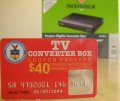
Way back on the 2nd day of this year I signed up for a digital TV converter box coupon. Actually I visited the site at about 2am on January 1st, but apparently they hadn't launched the site yet. Just this last week, on Tuesday in fact, my coupon finally arrived. I only got one because we only have one TV and if we were to ever get another TV, it would be digital so there really wasn't any point.
We had the option of shopping at Best Buy, Radio Shack, Circuit City and Walmart. Since I've sworn to never shop at Circuit City and to never buy electronics at Walmart, that left only two options. And Radio Shack kinda gives me the willies, so really I only had the one option. That's OK though. Best Buy hasn't ticked me off yet. Well, except that every time I go in they manage to slip my purchase into a plastic bag before I can ask them to use my canvas shopping bag. Oh, well.
I was hoping to have a few choices, which is why I took along the list of approved devices, but it turned out that Best Buy only carried a single model, the Insignia NS-DXA1. That made that easy. It was $59.99, which of course dropped to $19.99 with the coupon (plus tax).
For a quick review, I'll just say that the box works just as it is supposed to. We plugged it in, it scanned the frequencies and found every available channel. I was worried that I would have to get up and reorient my antenna (a large boom secured to my chimney). I was therefore extremely relieved that it Just Worked®. There was a brief period of concern though because it didn't pick up two channels, but after reading about them on Wikipedia I discovered that they were not assigned sister digital channels for the conversion. Instead, sometime between now and February 17, 2009 they will make an instant conversion. Luckily, those are the channels we watch the least.
With my digital converter the signal quality is great. The analog channels ranged from mostly OK to mostly not so much, but all were watchable. Now they're all crystal clear. We also now get 5 extra channels, one is a weather channel from the NBC affiliate, and 4 extra channels from PBS. The latter are a real bonus because one of them shows cartoons all day. My kids love PBS Kids.
My assessment would be that the digital conversion has gone well for me. Just took way too long. But is anybody really surprised about that?
Recent comments